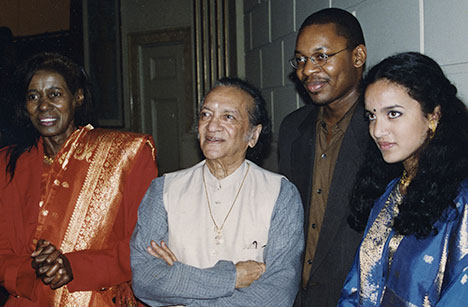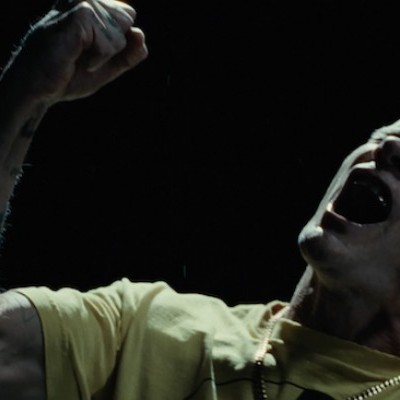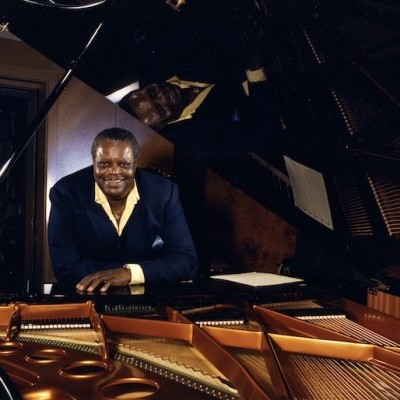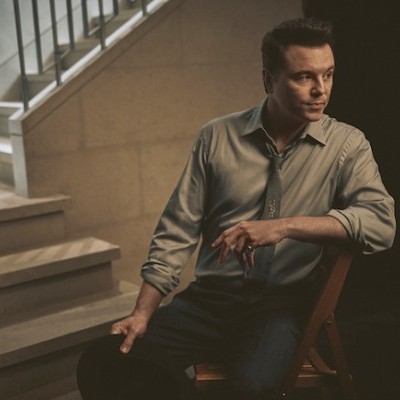Dec 9, 2025 12:28 PM
In Memoriam: Gordon Goodwin, 1954–2025
Gordon Goodwin, an award-winning saxophonist, pianist, bandleader, composer and arranger, died Dec. 8 in Los Angeles.…

Ravi Shankar (second from left) with Alice Coltrane, Ravi Coltrane and daughter Anoushka Shankar at New York’s Knitting Factory following a 1998 concert
(Photo: )Sitar virtuoso Ravi Shankar died on Dec. 11 at San Diego’s Scripps Hospital. Last week he underwent heart-valve replacement surgery, and although the procedure had been successful, recovery proved too difficult. He was 92.
Shankar helped popularize Indian classical music, and the sitar itself, around the world through his concerts, albums and film soundtracks.
Shankar won a Grammy in the category Best Chamber Music Performance for West Meets East (1967), a collaboration with violinist Yehundi Menuhin. Shankar also won a Grammy in the Best World Music Album category for Full Circle: Carnegie Hall, recorded during his 2000 world tour.
Released in April, Shankar’s The Living Room Sessions Part 1 is nominated for Best World Music Album for the 55th Annual Grammy Awards. Shankar posthumously will be honored with a Lifetime Achievement Award from The Recording Academy in February 2013.
Shankar and George Fenton won an Academy Award for their original score to the 1982 film Gandhi. Shankar also composed the music for director Satyajit Ray’s classic trilogy of “Apu” films made in the late 1950s.
The cover story for the March 7, 1968, issue of DownBeat, titled “The Impact of Ravi Shankar,” was accompanied by this description: “India’s Master Musician has become America’s idol-in-vogue.” Shankar told DownBeat Assistant Editor Bill Quinn that he had studied “all the famous names in jazz,” including the music of Louis Armstrong, Duke Ellington, Dizzy Gillespie, John Coltrane and Miles Davis.
Shankar said, “In Indian music, one does not have to follow prescribed rules of harmony; the music is based entirely on melodic form—it is free to invent its own course.”
Shankar’s collaborations with jazz artists included Improvisations with saxophonist Bud Shank and Portrait Of A Genius with flutist Paul Horn.
Among Shankar’s other famous collaborators were classical composer Philip Glass and Beatles guitarist George Harrison. Shankar and Harrison organized one of the first large-scale benefit concert events, the Concert for Bangladesh. The benefit consisted of two concerts held on the afternoon and evening of Aug. 1, 1971, at New York’s Madison Square Garden, and featured performances by Shankar, Harrison, Ringo Starr, Bob Dylan, Eric Clapton and Billy Preston. The resulting album won the Grammy for album of the year in 1972.
Shankar was largely responsible for introducing Indian music to massive rock festivals through his participation in the Monterey International Pop Festival in 1967 and Woodstock in 1969.
Titles in his extensive discography include Sound Of The Sitar, Inside The Kremlin and Concert For Peace: Royal Albert Hall. Shankar composed concertos for sitar and orchestra, and he also wrote music for ballets. He founded the Ravi Shankar Foundation in 1997 for students of music, dance and art.
He was born Robindro Shankar on April 7, 1920, in Varanasi, India. His last public performance was on Nov. 4 with his daughter, sitarist Anoushka Shankar.
In the 1970s, Shankar taught music at City College of New York, UCLA and California Institute of the Arts. He received 14 honorary doctorates, including one from Harvard University. In 1985, when Shankar received his doctorate from Cal Arts, the citation praised him as an artist “whose rare genius has opened the ears and minds of millions to the wondrous aesthetic of India’s ancient musical tradition.”
Saxophonist John Coltrane (who took lessons from Shankar) named his son, Blue Note recording artist Ravi Coltrane, after the sitarist.
Shankar’s books included My Music, My Life (1968), Learning Indian Music: A Systematic Approach (1979) and Raga Mala: The Autobiography of Ravi Shankar (1997).
Shankar is survived by his second wife, Sukanya Rajan, and their daughter, Anoushka Shankar. He also had a relationship with New York concert producer Sue Jones, with whom he fathered singer Norah Jones. His son, the musician Shubhendra “Shubho” Shankar, died in 1992.
For more information, visit the Ravi Shankar website.
—Bobby Reed

Goodwin was one of the most acclaimed, successful and influential jazz musicians of his generation.
Dec 9, 2025 12:28 PM
Gordon Goodwin, an award-winning saxophonist, pianist, bandleader, composer and arranger, died Dec. 8 in Los Angeles.…

Flea has returned to his first instrument — the trumpet — and assembled a dream band of jazz musicians to record a new album.
Dec 2, 2025 2:01 AM
After a nearly five-decade career as one of his generation’s defining rock bassists, Flea has returned to his first…

“It’s a pleasure and an honor to interpret the music of Oscar Peterson in his native city,” said Jim Doxas in regard to celebrating the Canadian legend. “He traveled the world, but never forgot Montreal.”
Nov 18, 2025 12:16 PM
In the pantheon of jazz luminaries, few shine as brightly, or swing as hard, as Oscar Peterson. A century ago, a…

Dec 11, 2025 11:00 AM
DownBeat presents a complete list of the 4-, 4½- and 5-star albums from 2025 in one convenient package. It’s a great…

Seth MacFarlane takes a turn from his television and film career to sing arrangements made for Frank Sinatra, but never recorded.
Nov 18, 2025 12:04 PM
“I’m not gonna lie to you — I don’t know why I thought this was about The Naked Gun, but I’m happy it’s…